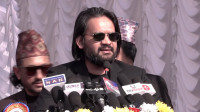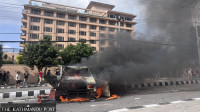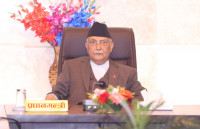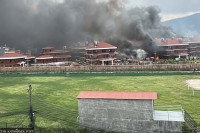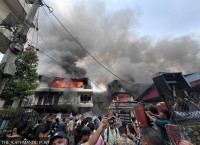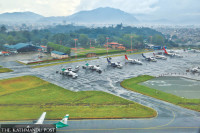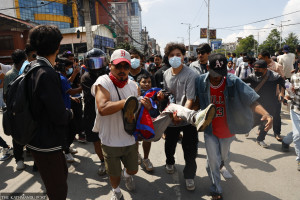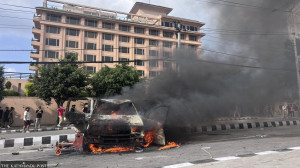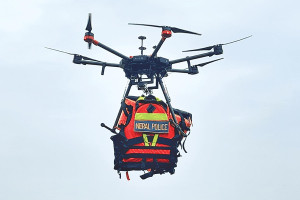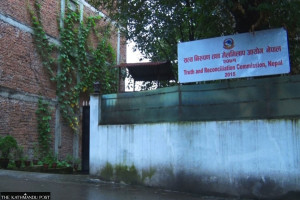National
Police transfers after announcing election date raise concerns
Observers say a caretaker government should stick to day-to-day administrative work rather than taking decisions that could influence the scheduled elections.
Tika R Pradhan
The Sher Bahadur Deuba government was reduced to a caretaker on Thursday following the announcement of federal and provincial polls, which are scheduled for November 20.
Despite the fact that a caretaker government cannot make any important decisions, the government has made a slew of transfers of security officials in the guise of deputation.
A day after the date for elections was announced, the government transferred 43 deputy superintendents of police (DSPs) and changed police chiefs of 10 districts on Friday.
“The DSPs were transferred on deputation on Friday,” said Deputy Inspector General of Police Tek Prasad Rai, spokesperson for the Nepal Police.
The Nepal Police plays a crucial role in providing security during elections and many say the transfers could even help create a favourable election environment for the ruling parties.
Similar transfers of government officials ahead of elections in the past had drawn strong condemnation especially from opposition parties as an attempt by the ruling forces to turn elections in their favour.
During the May 13 local polls, the main opposition CPN-UML had accused the ruling parties of misusing the administration and security apparatus to influence the outcome of elections.
“The home administration deployed police and civil servants in such a way as to benefit the ruling coalition,” said the statement issued by the UML after the May 13 elections.
According to the notice issued by the Nepal Police on Friday, Birendra Godar has been transferred on deputation to Sankhuwasabha, Rabindra Nath Poudel to Mustang, Prakash Shrimal to Lamjung, Sharad Kumar Thapa to Bhojpur, Jayashwar Rimal to Kalikot, Mukunda Prasad Rijal to Dang, Madhusudan Neupane to Parbat, Prem Bahadur Shahi to Baitadi and Jageshwar Bhandari to Bajhang districts.
The Nepal Police has also changed the chiefs of important police offices within Kathmandu Valley. Nishant Bhandari has been sent to New Baneshwar, Kopila Chudal to Police Circle Durbar Marg, Rabin Bista to Balaju, Rajkumar Shrestha to Jagati (Bhaktapur), Sanjiv Babu Khadka to Gaushala, Hari Bahadur Basnet to Bauddha, Ganesh Bahadur Bam to Lainchaur, Angur GC to Maharajgunj, Tarkaraj Pande to Maligaun, and Resham Bohara to Rani Pokhari on deputation.
Besides the transfers, the government is working to push crucial bills in Parliament and opposition leaders and experts are questioning whether a caretaker government can do such things.
Since the bills tabled in Parliament could have long-term repercussions and influence voters, many constitutional experts and observers have said a caretaker government should not push the bills.
Speaking at the House of Representatives on Sunday after the House decided to send the impeachment motion against the suspended chief justice Cholendra Shumsher Rana to its investigation committee, UML leader and lawmaker Pradeep Gyawali questioned whether the caretaker government could give business to Parliament.
Security experts also smell a rat in the police deputations.
Former deputy inspector general of Nepal Police Hemanta Malla said there was a long practice among the rulers of misusing the local administration—chief district officers and the police to manipulate the election process.
“There is no doubt that these police transfers were made with the intention to influence the polls,” Malla told the Post. “But it doesn’t mean that all those transferred officials would be willing to do whatever they are asked to do by politicians, unless those giving orders are political heavyweights with the capacity to provide cover for unlawful activities.”
According to Malla, Budhiganga Municipality in Bajura district can be taken as an example of how security forces can influence the vote. The Election Commission had to conduct a repeat election in the Municipality after its study, according to an official at the polls body, found evidence of ballot rigging.
Senior officials at the Home Ministry said the government may transfer chief district officers as well, as part of “a regular process.”
“In general chief district officers are normally transferred in 10-11 months and sometimes based on their individual requests, so it would not be a surprise if they are also transferred ahead of the elections,” said Tek Bahadur KC, joint secretary who leads the administration department of the Home Ministry. “But there won’t be bulk transfers.”
KC said there was a trend earlier of transferring chief district officers en masse with the intention to influence the polls as their role becomes crucial in conducting the polls. “We will transfer only on the basis of necessity,” KC told the Post.
But some experts are of the view that the government’s hands should not be tied under the pretext of elections.
As the election approaches, the Election Commission issues a code of conduct for government officials and political parties, among others.
Observers say although the announcement of elections should not automatically lead the government to inaction, whether the issue of transferring security officials after announcing the polls was right depends on the intention.
“The understanding is that security officials should not be transferred after the poll date is announced. But what the government has done is not unnatural given the attitude of our rulers who often misuse state resources,” Bhojraj Pokharel, former chief election commissioner, said. “The government should abide by the election code of conduct once the Election Commission issues one.”
The Election Commission issues the code of conduct 35 days before the election day.
Pokharel said there is a trend in countries like Nepal of those in power misusing state resources in favour of the ruling party and spoiling the level playing field.
“The major concern is the intention of those wielding power. If they have good intentions in transferring security officials, no one will raise questions, but the problem in our country is we have no leaders with integrity and ethics,” Pokharel told the Post.
In a democracy, observers say, once the government announces the polling date its role is only to conduct the elections in a free and fair manner and hand over the reins to the elected government. Meanwhile, it needs to focus only on day-to-day administration while assisting the Election Commission in its duty.
Congress lawmakers, however, refuse to admit that the government has turned into caretaker. They claim that the Deuba government can work in a full-fledged manner, as usual.
Addressing the House of Representatives on Sunday, Nepali Congress lawmaker Dila Sangroula claimed the Deuba government is not a caretaker.
Also, the whip of the Nepali Congress parliamentary party Min Bishwakarma, speaking to reporters on Sunday, claimed that the government turns into a caretaker only if the prime minister resigns, loses confidence of Parliament or the House is dissolved.
UML leaders disagree.
“I was surprised to learn about the police transfers in the guise of deputation,” said Subas Nembang, deputy leader of UML parliamentary party. “This clearly shows the government has ill intention.”




 23.12°C Kathmandu
23.12°C Kathmandu
